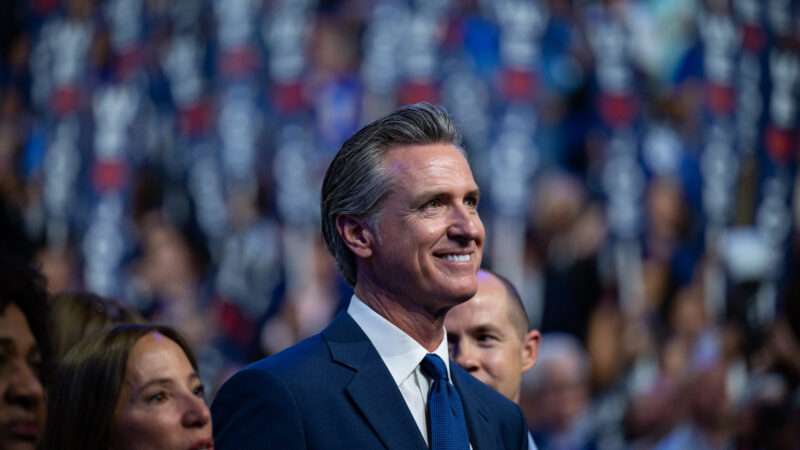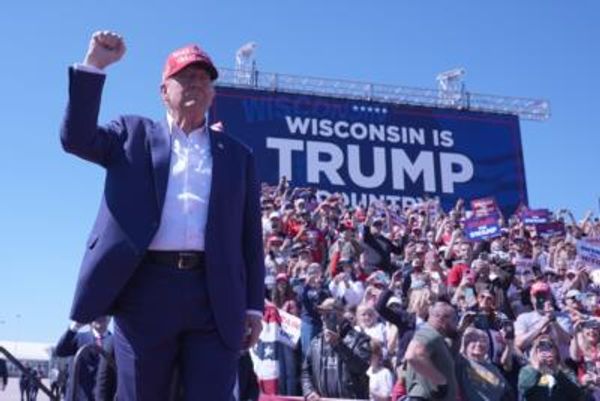
Last week, California Gov. Gavin Newsom proposed strict new rules on intoxicating substances derived from hemp. The crackdown would give the Golden State more punitive drug laws than even Florida.
Newsom, who was floated as a potential replacement for Joe Biden on the Democratic presidential ticket, announced new "emergency regulations" on Friday. Under the new rules, any "industrial hemp final form food product intended for human consumption" must contain "no detectable amount of total THC," and "each package shall have no more than five servings." The new regulations would also prohibit anyone under the age of 21 from purchasing any hemp-derived food products.
Newsom sold the new regulations as necessary to protect children from accessing intoxicating products. "The industry bears full responsibility for not policing itself for the proliferation of these intoxicating products that are hurting our children," Newsom said at a press conference announcing the new regulations.
THC is the psychoactive compound that occurs naturally in cannabis. Typically, this refers to delta-9-tetrahydrocannabinol, which creates the "high" from smoking marijuana, though there are other variations as well: Delta-8-THC occurs in hemp—derived from the same plant as marijuana—and presents a similar, though milder, response compared to delta-9.
In the 2018 farm bill, Congress legalized industrial hemp by defining it as a cannabis byproduct with "not more than 0.3 percent" delta-9-THC concentration. As a result, an entire industry emerged in which companies manufactured intoxicating products containing delta-8, which could be synthesized from hemp.
But Newsom's "emergency" rules define THC to include both delta-8 and delta-9, as well as numerous other cannabis byproducts. While federal law allows a hemp-derived substance to be up to 0.3 percent delta-9, Newsom would prefer the limit be zero percent, and he would make manufacturers "provide documentation that includes a certificate of analysis from an independent testing laboratory to confirm the amount of total THC…does not exceed the total THC per serving size limits."
At his press conference, Newsom touted his pro-cannabis credentials, stating that during his time as lieutenant governor he undertook "a very comprehensive and transparent process to put a white paper forward, to advance a paradigm that ultimately led to" Proposition 64, a ballot initiative effectively legalizing marijuana in California, "that I helped draft, that I helped organize, aided by and informed by that white paper."
And yet Newsom recounted this history in service of imposing punitive rules on the state not only without the input of state lawmakers but also in direct defiance of them. A bill in the state Legislature limiting the amount of THC allowed in hemp-derived products died in committee last month.
At Friday's press conference, California Health and Human Services Secretary Mark Ghaly proclaimed that Newson displayed "leadership" by enacting the rules unilaterally after "the legislative process didn't move forward on getting us something that provided safety to Californians, especially our young people."
Newsom's actions should certainly vex any civil libertarian, but they also reflect poorly on his longtime rivalry with Florida Gov. Ron DeSantis.
In November 2023, Newsom met for a debate with DeSantis, who was then running for the Republican Party's presidential nomination. The televised spat was the culmination of a yearslong dispute between the two governors over whose state offered its citizens more freedom.
On this issue, the difference is stark: In 2019, Florida passed a law adopting the federal hemp standards at the state level, allowing hemp-derived products that contain less than 0.3 percent delta-9-THC. In November, Floridians will vote on Amendment 3, which would allow adults at least 21 years old to consume marijuana recreationally—a proposal endorsed by Florida resident and former President Donald Trump.
In fairness, DeSantis himself opposes Amendment 3. But when the Florida Legislature passed Senate Bill 1698, which would have kept delta-9 under 0.3 percent while forbidding delta-8 and all other variations, DeSantis vetoed the legislation.
"Senate Bill 1698 would introduce dramatic disruption and harm to many small retail and manufacturing businesses in Florida—businesses that have emerged due to recent legislation paving the way for the commercial use of hemp," DeSantis wrote in his veto letter. "I encourage the Florida Legislature to reconsider this topic during the next Legislative Session….Sensible, non-arbitrary regulation will provide businesses and consumers alike with much-needed stability."
"Gov. Newsom is saying that hemp products are a risk to youth," Jim Higdon, co-founder of Cornbread Hemp, tells Reason in an email. But Higdon calls Newsom's emergency proposals "bad-faith attempts to eliminate the hemp industry, not to protect children," and "a protection racket for California's cannabis industry."
Newsom contends that his state is a bastion of freedom and that his new regulations on hemp products are meant to protect the children. But by writing the rules to forbid any trace of THC in any of its forms, he is effectively criminalizing an entire industry with the stroke of a pen.
The post Gavin Newsom Wants California To Have More Restrictive Drug Laws Than Florida appeared first on Reason.com.










